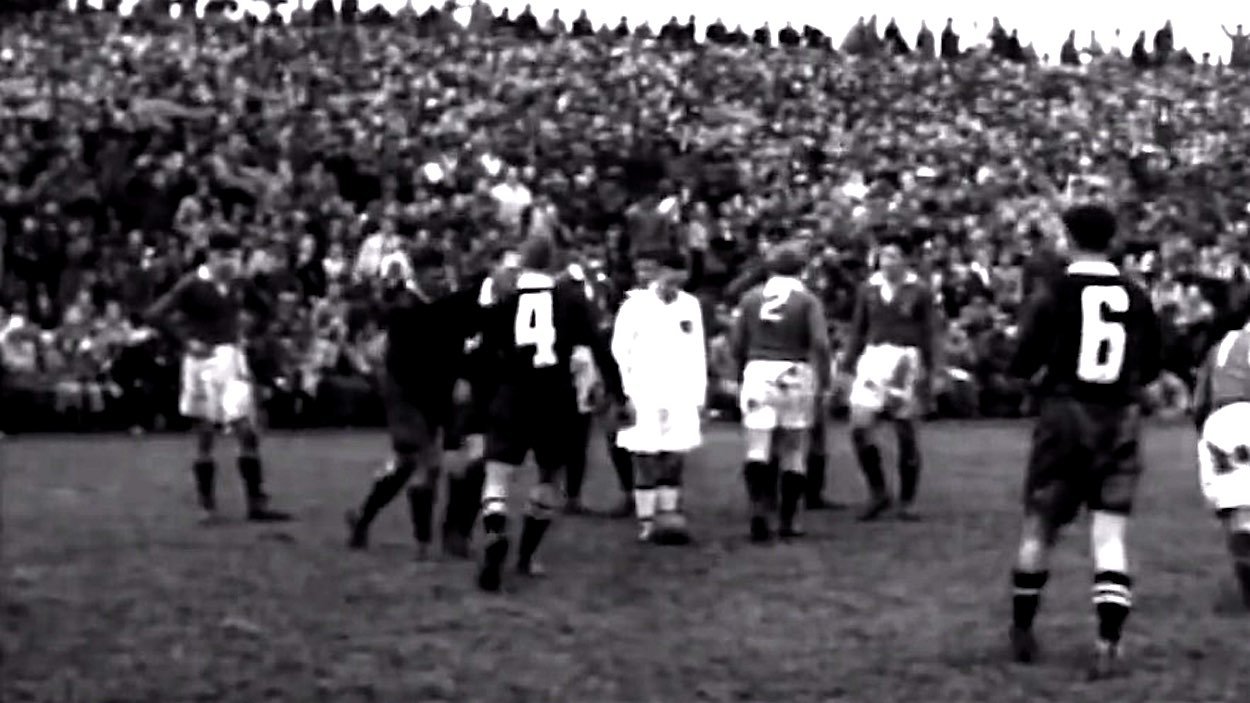Great moments in Lions tour history: The All Blacks captain who scored with a broken collarbone

The story of Ron Elvidge is so good it should be made into a movie.
Chasing Great. The Kick. Old Scores. There have been a few attempts to make the great New Zealand rugby film.
Probably the most well-known motion picture involving the All Blacks is the Clint Eastwood-directed Invictus. However, it left a sour taste in the mouth of many Kiwi fans as it completely overlooked the ‘Suzie the Waitress’ food poisoning scandal that clearly cost the team the 1995 World Cup Final. (Fun fact: Matt Damon, who played Francois Pienaar in the film, also briefly played a flanker in The Departed).
But what about this tale for the Hollywood treatment: the 1950 All Blacks captain leads the team against the best of the British, gets his face gashed open in a ruck and later in the game breaks his collarbone. His team needs him – there’s no subs in these days – so he returns to the field and scores the winning try despite being in agonising pain. He never plays again, finishing his career with one of the most glorious and courageous plays in All Blacks history.
That’s all true: Ron Elvidge was the All Black midfielder and skipper that day against the Lions at Athletic Park some 67 years ago.
[rugbypass-ad-banner id=”1473306980″]
Elvidge had already captained the Otago side to a 23-9 win over the Lions earlier in the tour, but the blustery Wellington weather meant that the aggregate of points in the second test was never going to be as high as that. In fact, it was the staunch defensive nature of the game that gave Elvidge the injury that forced him from the field.
Rugby was different back in the years following the Second World War, but you can tell it was starting to take shape into the highly physical contest we see today. Tackles were a bit meaner, and the All Black captain found himself with a fractured collarbone after one fierce collision.
While he was getting treatment for that and a deep gash on his face, team mate Johnny Simpson had to leave the field injured. Substitutions were still another 18 years away, so the All Blacks were down to 13. Elvidge returned to the field despite one arm hanging limply by his side.
With one good arm he held onto a pass and dove over, despite the try being probably one of the most painful acts imaginable in his condition. But, as they say, they bred them tough in the old days. Final score: All Blacks 6, Lions 3.
His injury meant he missed the final test in a series won 3-1 by the All Blacks. He was never picked again, but today has the honour of being the oldest living All Black at the grand old age of 94.
His story has everything a decent movie needs: triumph over adversity, an interesting period setting, and plenty of opportunities for montage and slow motion sequences. The character of Elvidge as a good, honest Kiwi bloke could be filled by any number of Hollywood leading men – although the New Zealand accent is notoriously difficult to pull of, so they might want to get someone local.
One thing is for sure though, and I’m well aware I’m breaking my self-imposed ban on the subject. Someone has to invite Brian O’Driscoll to the premiere, so he can see the proper way you deal with a collarbone injury.



































